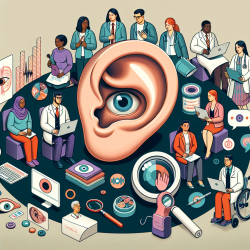Introduction: The Power of Traditional Medicine in Modern Therapy
As speech-language pathologists, we are constantly seeking innovative ways to enhance therapeutic outcomes for children. One promising avenue is the integration of traditional medicine into our therapeutic practices. A recent study titled "Introduction to Traditional Medicine and Their Role in Prevention and Treatment of Emerging and Re-Emerging Diseases" highlights the significant potential of natural products in modern medicine. This blog explores how these findings can be applied to improve child therapy outcomes, encouraging practitioners to delve deeper into this fascinating area of research.
Understanding the Research: Traditional Medicine's Role in Disease Prevention
The research underscores the effectiveness of traditional medicine in combating infectious diseases, emphasizing the adaptability of microorganisms and the subsequent resistance to conventional therapeutic agents. Traditional medicine, with its roots in natural products, offers a complementary approach to modern pharmaceuticals. Approximately 25% of contemporary drugs are derived from plants, showcasing the profound impact of natural products on modern medicine.
Applying Traditional Medicine in Child Therapy
Integrating traditional medicine into child therapy can offer several benefits:
- Enhanced Immune Support: Natural supplements such as elderberry and zinc have shown promise in boosting immunity, which is crucial for children undergoing therapy.
- Improved Cognitive Function: Nutraceuticals like curcumin and quercetin have been linked to enhanced cognitive function, potentially aiding children with speech and language disorders.
- Holistic Well-being: Practices such as Ayurveda and yoga promote a holistic approach to health, focusing on the balance between mind, body, and spirit, which can be beneficial in therapeutic settings.
Encouraging Further Research
While the integration of traditional medicine into child therapy shows promise, further research is essential to fully understand its potential. Practitioners are encouraged to explore the following areas:
- Clinical Trials: Conducting clinical trials to assess the efficacy of specific natural products in child therapy settings.
- Cross-disciplinary Collaboration: Collaborating with experts in traditional medicine to develop evidence-based therapeutic interventions.
- Longitudinal Studies: Investigating the long-term effects of traditional medicine on child therapy outcomes.
Conclusion: Embracing a Multidisciplinary Approach
Incorporating traditional medicine into child therapy represents a promising frontier for enhancing therapeutic outcomes. By embracing a multidisciplinary approach, practitioners can leverage the power of natural products to support children's health and well-being. As we continue to explore this exciting field, we can unlock new possibilities for improving the lives of the children we serve.
To read the original research paper, please follow this link: Introduction to Traditional Medicine and Their Role in Prevention and Treatment of Emerging and Re-Emerging Diseases.










